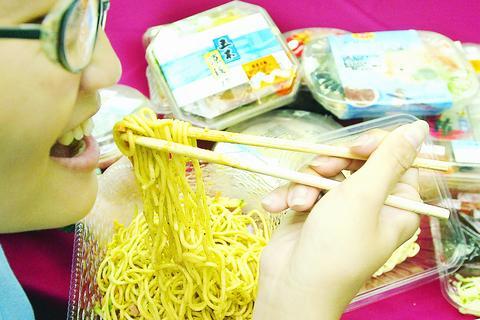A local consumer advocacy group yesterday warned the public that cold noodles may pose a health risk, with the majority of cold noodles sold in convenience stores containing harmful bacteria.
In a investigation report unveiled by the Consumers' Foundation (

PHOTO: LIAO CHENG-HUEI, LIBERTY TIMES
"Cold noodles, among other things, are hot items in Taiwan during the summer," said Shyu Yuan-tay (
According to Shyu, the foundation collected 22 types of cold noodles from five convenience-store chains in the Greater Taipei area in late May to conduct hygiene checks.
Based on its investigation, the foundation singled out two convenience store chains: Family Mart Co (全家) and OK Mart Co, as the most unsanitary retailers, with nearly three-fourths of the chilled noodles in their outlets failing to meet hygienic standards, followed by Niko Mart Co's (福客多) 67 percent, while President Chain Store Corp (統一超商), which runs 7-Eleven, was at 60 percent and Hi-Life International Co's (萊爾富) 33 percent.
All of the cold noodles contain over-standard Escherichia coli, which can result in such health problems as severe stomach pains and diarrhea, said Shyu, who is also a professor of horticulture at National Taiwan University.
Actually, any chilled foods, such as cold noodles, sushi and sandwiches should be refrigerated at temperatures below 7?C throughout the distribution process, Shyu noted.
But many convenience stores simply failed to follow the guidelines, allowing refrigerated foods to become breeding grounds for bacteria, he said.
Shyu stressed that with increasing numbers of people turning to convenience stores for quick meals, the food sanitation issue is more important than ever.
"Nonetheless, our report's goal is to raise public awareness and hopefully place pressure on retailers to improve food quality control," Shyu stressed.
In accordance with business ethics and the nation's Food Management Law (
In response, retailers said they would make improvements to comply with the law.
"We will ask cold-noodle makers, transport companies and store employees to closely monitor the temperature of food containers," said Wang Pao-yu (
Currently, sales of hot snacks and fresh food account for some 7 percent of the chain's total sale every month, of which cold noodles comprise nearly 20 percent, Wang said.
The foundation also reminded the public that cold noodles sold by street vendors can be even more dangerous.
"Without a centralized production process, the quality control of the food is more difficult to maintain," Shyu said.
He suggested consumers buy chilled noodles from retailers with sanitary environments and preserve the products in refrigerators.

Taiwan Semiconductor Manufacturing Co (TSMC, 台積電) halted shipments to a customer this month after its semiconductors were sent to China’s Huawei Technologies Co (華為), potentially breaching US sanctions, a government official said. The US slapped sanctions on Huawei in 2019, and expanded them the following year, over fears its technology could be used for Beijing’s espionage operations. The restrictions prevent TSMC from selling semiconductors to Huawei. However, TSMC discovered on Oct. 11 that chips made for a “specific customer” had ended up with the Chinese company, a Taiwanese official with knowledge of the incident said on the condition of anonymity. TSMC “immediately activated

US SANCTIONS: The Taiwan tech giant has ended all shipments to China-based Sophgo Technologies after one of their chips was discovered in a Huawei phone Taiwan Semiconductor Manufacturing Co (TSMC, 台積電) suspended shipments to China-based chip designer Sophgo Technologies Ltd (算能科技) after a chip it made was found on a Huawei Technologies Co (華為) artificial intelligence (AI) processor, according to two people familiar with the matter. Sophgo had ordered chips from TSMC that matched the one found on Huawei’s Ascend 910B, the people said. Huawei is restricted from buying the technology to protect US national security. Reuters could not determine how the chip ended up on the Huawei product. Sophgo said in a statement on its Web site yesterday that it was in compliance with all laws

TECH TITANS: Nvidia briefly overtook Apple again on Friday after becoming the world’s largest company for a short period in June, as Microsoft fell to third place Nvidia Corp dethroned Apple Inc as the world’s most valuable company on Friday following a record-setting rally in the stock, powered by insatiable demand for its specialized artificial intelligence (AI) chips. Nvidia’s stock market value briefly touched US$3.53 trillion, slightly above Apple’s US$3.52 trillion, London Stock Exchange Group data showed. Nvidia ended the day up 0.8 percent, with a market value of US$3.47 trillion, while Apple’s shares rose 0.4 percent, valuing the iPhone maker at US$3.52 trillion. In June, Nvidia briefly became the world’s most valuable company before it was overtaken by Microsoft Corp and Apple. The tech trio’s market capitalizations have been

Shares of Starlux Airlines Co (星宇航空) surged more than 53 percent on its debut on the Taiwan stock exchange yesterday. Starlux shares closed up 53.75 percent at NT$30.75 from its initial public offering price of NT$20 after retreating in late trading from a 60 percent rise. China Airlines Ltd (CAL, 中華航空) rose 0.90 percent to close at NT$22.35, while EVA Airways Corp (長榮航空) gained 0.40 percent to close at NT$37.70. In Taiwan, a newly listed stock is allowed to go beyond the 10 percent maximum increase or decline in its first five trading sessions. At the listing ceremony, Starlux chairman Chang Kuo-wei (張國煒) said